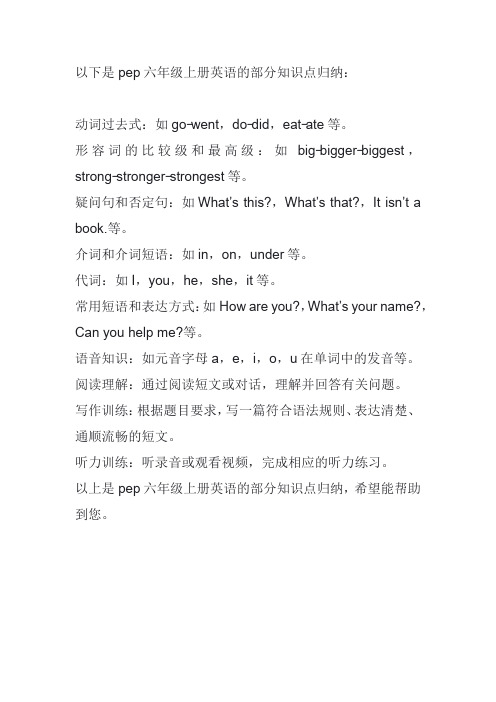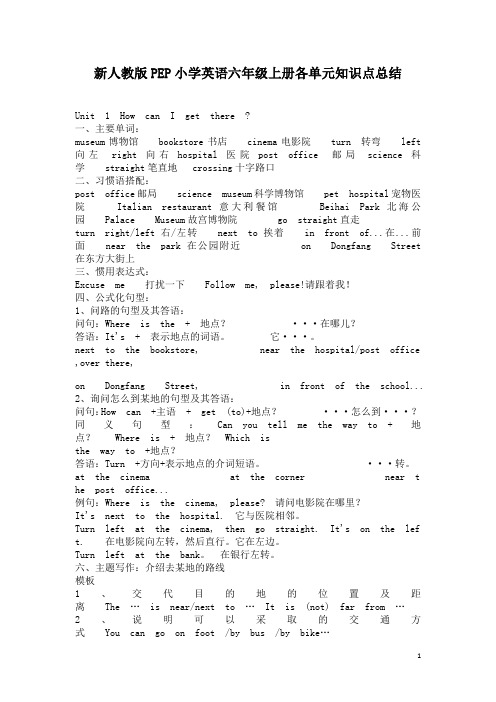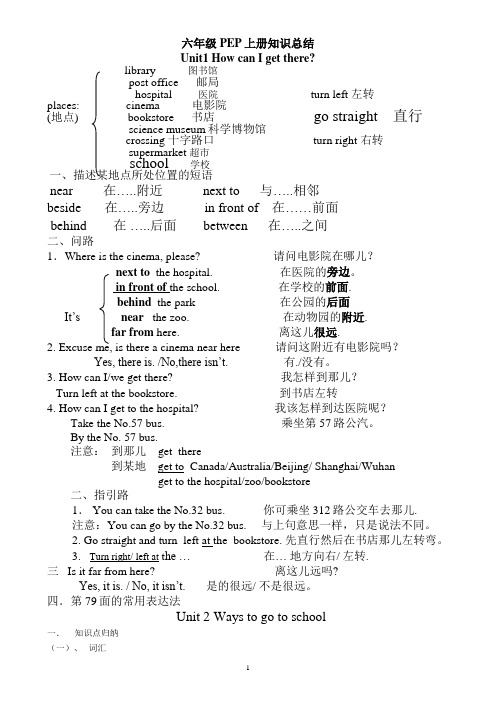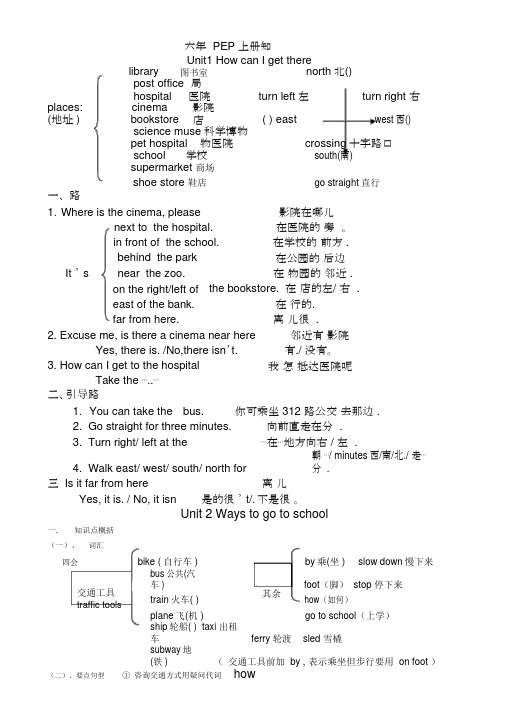pep六年级英语上下册知识点总结
详细PEP新人教版小学英语六年级下册知识点归纳总结(高效记忆)课件

I wear size 7 shoes. 我穿7码的鞋。
句型
比较级,用来对自己和 他人的身体特征进行比较
I'm thinner than you. 我比你瘦。
My hands are bigger than yours. 我的手比你的手大。
Your feet are bigger than mine. 你的脚比我的脚大。
badminton 羽毛球运动
cycling 骑自行车运动
go cycling 骑自行车
原形→过去式。
be 动 词
am/ is→ was
are→were
feel→felt感觉
think→thought认为,想
wake→woke 醒来
Unit 4 Then and now
句型—
表示以前 没有某物
过去不能做或 者不会做某事
PEP人教版六年级下册
Unit 2 Last Weekend
思维导图记忆法
Unit 2 Last Weekend
clean my room 打扫我的房间
clean→cleaned 打扫
watched TV 看电视
watch→ watched 看
stayed at home 待在家里
stay→stayed 待在
There was no+单数名词/不可数名词+过去时间 chool.
There was no library in my old s 在我以前的学校里没有图书馆 。
There were no+复数名词+过去时间
time.
在我那时候没有电脑有没有网络。 There were no computers or Internet in my
pep六年级上册英语知识点归纳

以下是pep六年级上册英语的部分知识点归纳:
动词过去式:如go-went,do-did,eat-ate等。
形容词的比较级和最高级:如big-bigger-biggest,strong-stronger-strongest等。
疑问句和否定句:如What’s this?,What’s that?,It isn’t a book.等。
介词和介词短语:如in,on,under等。
代词:如I,you,he,she,it等。
常用短语和表达方式:如How are you?,What’s your name?,Can you help me?等。
语音知识:如元音字母a,e,i,o,u在单词中的发音等。
阅读理解:通过阅读短文或对话,理解并回答有关问题。
写作训练:根据题目要求,写一篇符合语法规则、表达清楚、通顺流畅的短文。
听力训练:听录音或观看视频,完成相应的听力练习。
以上是pep六年级上册英语的部分知识点归纳,希望能帮助到您。
新人教版PEP小学英语六年级上册各单元知识点总结

新人教版PEP小学英语六年级上册各单元知识点总结Unit 1 How can I get there ?一、主要单词:museum博物馆bookstore书店cinema电影院turn 转弯left 向左right向右hospital医院post office 邮局science科学straight笔直地 crossing十字路口二、习惯语搭配:post office邮局science museum科学博物馆pet hospital宠物医院Italian restaurant意大利餐馆Beihai Park北海公园Palace Museum故宫博物院go straight直走turn right/left右/左转next to挨着in front of...在...前面near the park在公园附近on Dongfang Street 在东方大街上三、惯用表达式:Excuse me 打扰一下Follow me, please!请跟着我!四、公式化句型:1、问路的句型及其答语:问句:Where is the + 地点?···在哪儿?答语:It's + 表示地点的词语。
它···。
next to the bookstore, near the hospital/post office ,over there,on Dongfang Street, in front of the school...2、询问怎么到某地的句型及其答语:问句:How can +主语+ get (to)+地点?···怎么到···?同义句型:Can you tell me the way to +地点?Where is + 地点?Which isthe way to +地点?答语:Turn +方向+表示地点的介词短语。
新版PEP小学英语六年级上册1-6单元知识点总结

六年级PEP上册知识总结Unit1 How can I get there?library 图书馆post office 邮局hospital 医院turn left 左转places: cinema 电影院(地点) bookstore 书店go straight 直行science museum科学博物馆crossing 十字路口 turn right 右转supermarket 超市school 学校一、描述某地点所处位置的短语near 在…..附近 next to 与…..相邻beside 在…..旁边 in front of 在……前面behind 在…..后面 between 在…..之间二、问路1.Where is the cinema, please? 请问电影院在哪儿?next to the hospital. 在医院的旁边。
in front of the school. 在学校的前面.behind the park 在公园的后面It’s near the zoo. 在动物园的附近.far from here. 离这儿很远.2. Excuse me, is there a cinema near here 请问这附近有电影院吗?Yes, there is. /No,there isn’t. 有./没有。
3. How can I/we get there? 我怎样到那儿?Turn left at the bookstore. 到书店左转4. How can I get to the hospital? 我该怎样到达医院呢?Take the No.57 bus. 乘坐第57路公汽。
By the No. 57 bus.注意:到那儿 get there到某地 get to Canada/Australia/Beijing/ Shanghai/Wuhanget to the hospital/zoo/bookstore二、指引路1. You can take the No.32 bus. 你可乘坐312路公交车去那儿.注意:You can go by the No.32 bus. 与上句意思一样,只是说法不同。
人教版(PEP)六年级英语上册期末复习知识点

人教版(PEP)六年级英语上册期末复习知识点人教版(PEP)六年级英语上册复习知识点Unit 1 How can I get there?主要单词:science科学museum博物馆post office邮局bookstore书店cinema电影院hospital医院crossing十字路口turn转弯left 向左ask问interesting有趣的Italian意大利restaurant餐馆pizza 比萨饼street大街;街道get到达GPS全球卫星定位系统feature特点follow跟着far较远的tell告诉习惯搭配turn left向左转turn right向右转go straight直行in front of...在...前面next to挨着go straight直走near the park在公园附近on Dongfang Street在东方大街上post office邮局pet hospital 宠物医院Beihai Park北海公园Italian restaurant意大利餐馆Palace Museum故宫博物院science museum科学博物馆主要句子:☆1、☆Where is the museum shop?博物馆的市肆在哪儿?☆☆2、It’s near the door.在大门附近。
☆☆3、How can we get there?我们怎么到那儿?☆☆4、Turn left at the bookstore.在书店左转。
☆5、I want to buy a postcard.我想买一张明片。
6、I’ll ask.我去问问。
7、Wow, a talking robot!哇!一个讲话机器人。
8、What a great museum!好棒的一家博物馆!10、There is a pet hospital in my city.在我的城市有一家宠物医院。
11、Wu Yifan and Robin are looking at some robots.吴一凡和罗宾正在看一些机器人。
新版PEP小学英语六年级上册1-6单元知识点总结

六年 PEP 上册知Unit1 How can I get therelibrary图书室north北()post office 局hospital医院turn left左turn right 右places:cinema影院( ) east west西() (地址 )bookstore店science muse科学博物crossing十字路口pet hospital 物医院school学校south(南)supermarket 商场一、路shoe store 鞋店go straight直行1.Where is the cinema, please影院在哪儿next to the hospital.在医院的旁。
in front of the school.在学校的前方 .behind the park在公园的后边It ’ s near the zoo.在物园的邻近 .on the right/left of the bookstore. 在店的左/ 右 .east of the bank.在行的.far from here.离儿很 .2. Excuse me, is there a cinema near here邻近有影院Yes, there is. /No,there isn’t.有./ 没有。
3. How can I get to the hospital我怎抵达医院呢Take the ⋯..⋯二、引导路1. You can take the bus.你可乘坐 312 路公交去那边 .2. Go straight for three minutes.向前直走在分 .3. Turn right/ left at the⋯在⋯地方向右 / 左 .4. Walk east/ west/ south/ north for 朝⋯/ minutes西/南/北./ 走⋯分 .三 Is it far from here离儿Yes, it is. / No, it isn是的很’ t/.不是很。
pep六年级英语下册知识点总结
六年级下册英语知识点总结第一单元(Unit1 How tall are you?)单词: tall—taller更高的short—shorter 更矮的strong—strong更强壮的old—older年龄更大的young—younger 更年轻的big—bigger更大的heavy—heavier 更重的long—longer 更长的thin—thinner更瘦的small—smaller 更小的 dinosaur恐龙 hall大厅 metre,meter 米kilo meter千米than比 both A and B两个都 kilo gram千克,公斤 countryside乡村 country乡村,国家low—lower更低的shadow阴影,影子 smart—smarter更聪明的 become开始变得,变成-became-become句子: 1、That's the tallest dinosaur in this hall.那是这个厅里最高的恐龙。
2、You’re older than me. 你比我大。
3、How tall are you ?你有多高? I’m 1.65 metres.我身高1.65米。
point点4、What size are your shoes ?你穿多大号的鞋?5、My shoes are size 37. 我穿37号的鞋。
6 、Your feet are bigger than mine .你的脚比我的大。
名词性物主代词=形容词性物主代词+名词7、How heavy are you ?你有多重? I’m 48 kilograms .我体重48公斤。
8、It’s taller than both of us together .它比我们俩加在一起还高。
应该掌握的知识点:1、形容词变为比较级的变化规则:(1)一般情况下,在形容词的词尾直接加er。
如: tall—taller short—shorter.(2)以字母e结尾的形容词,在词尾直接加r,如:nice—nicer. late—later(3)以重读闭音节结尾(辅+元+辅),且结尾只有一个辅音字母的词,先双写这个辅音字母,再加er.如:big—bigger thin—thinner fat—fatter(4)以辅音字母加y结尾的双音节形容词,先变y为i , 再加er。
新版PEP小学英语六年级上册1-6单元知识点总结
六年级PEP上册知识总结Unit1 How can I get therelibrary 图书馆north (北)post office 邮局hospital 医院turn left 左转 turn right 右转places: cinema 电影院(地点) bookstore 书店 (东) east west (西)science muse科学博物馆pet hospital 宠物医院 crossing 十字路口school 学校south(南) supermarket 超市shoe store 鞋店go straight 直行一、问路1.Where is the cinema, please 请问电影院在哪儿next to the hospital. 在医院的旁边。
in front of the school. 在学校的前面.behind the park 在公园的后面It’s near the zoo.在动物园的附近.on the right/left of the bookstore. 在书店的左/右边.east of the bank. 在银行的东边.far from here. 离这儿很远.2. Excuse me, is there a cinema near here 请问这附近有电影院吗Yes, there is. /No,there isn’t. 有./没有。
3. How can I get to the hospital 我该怎样到达医院呢Take the …..…二、指引路1. You can take the bus. 你可乘坐312路公交车去那儿.2. Go straight for three minutes. 向前直走在分钟.3. Turn right/ left at the … 在… 地方向右/ 左转.4. Walk east/ west/ south/ north for … minutes. 朝东/ 西/南/北/ 走…分钟.三 Is it far from here 离这儿远吗Yes, it is. / No, it isn’t.是的很远/ 不是很远。
精选PEP六年级英语上册知识点总结(完整版)
drivers drive on the left side of the road. 英国和澳大利亚,司机是靠左行驶的。
Wednesday, on Thursday, on Friday, on Saturday, on Sunday. 六年级上册知识点梳理Unit1 How can I get there? 我怎样到达这里?一:重点单词和短语7.on foot= walk, 都是走路的意思,但是用法不同, on foot 用在句子末尾,而5.6.在表达第几路公交车时,注意在哪里上下车, 在哪里左右转, 在电影院的地方上下车。
左右转。
No. 的书写, N 要大写,后面别少了一点! !!都用介词 at ,例如: Get on/ off at the cinema. Turn left/ right at the bookstore. 在书店的地方walk 用法与 走路去上学 go 相同,可以代替 :walk to school go 的位置。
走路去上班 例如:走路回家: walk to workwalk home走路去医院Science 科学 , museum 博物馆 , post office, bookstore, cinema, hospital , tasty, buy, walk to the hospitalUnit2 Ways to 一:重点单词和短语London Eye 伦敦银 , stomach 胃 ,crossing 十字路口 ,, turn left, turn right,gonearandgo to school 上学的方法 7. by the No. 12 bus= take the No. 12 bus. 坐 12 路公交车Unit 3 My weekend plan 我的周末计划straight=walk straight 直走 .next to 紧挨着 / 与 相邻 far from( 离 远 ), 在 附近 ,behind (在 之间)后面) , in front of (在前面) , between 一:知识点小结重点单词和短语on foot= walk, 车走路 by bus =take a bus 乘公交车 by plane,乘飞机 by taxi 乘出租 (在和visit 拜访 film 电影 see a film 看电影 trip 旅游 take a trip 去旅游 supermarket, 超 二:按要求写单词: 市 evening 晚上,傍晚 tonight 在今晚 tomorrow 明天 next week 下周 dictionary 乘船 by subway 乘地铁 by train 乘火车 by bike 骑自行车 by ferry 乘轮by ship hot( 反义词 )cold , can not(缩写 )can ’tcool( 反义词 )warm , too (同音词) to/two渡 Hooray! 好极了 slow down 慢下来 , stop 停 wait 等 pay attention to 注意 字典 comic 滑稽的 comic book 连环画册 word book 单词本 postcard 明信片 learn 学习 teach 教 disturb 打扰 without 没有 pool 池子 jump in 跳进 remember 记住 right( 反义词 )left/wrongbuy(同音词 )by/byesea(同/does cross the road 横穿马路 traffic light 通信号灯 at home 在家 missed ( miss 的过去音词 )see first (基数词) four( 序数词 ( 原形 one )fourth did )do 式)想念different, 不同chopsticks,筷子(复数) cross 穿过 look right 向右看lesson 课 space 太空a snowman 堆雪人 of 许多 二:按要求写单词 trave (l 尤指长途) 旅游 half 一半 price 价格 moon 月亮 make three(序数词 )third 三、重点句子give(过去式 )gave same 相同的 door 门 look at 朝 看play with 和一起玩 buy 买wantshare sth (事 )with sb (人) 和某人分享某物lots of= a lotto 想要a pair of 一双get on 上车 get off 下车 turn left 左转 turn right 右driver 司机 1. How do you go to school? 你是怎样去上学的? 2. w here is the restaurant? 餐馆在哪里?转 am 上午 pm 下午 now 现在 look for 寻找 top 停止 get to 到达 look for ( 同义词 ) findsee (同义词 ) watch/lookleaf ( 复数 ) leaves 同义词 ) moviethis ( 反 must 必须二、按要求写单词: picture ( 复数 ) picturesfilm ( 3. Usually I go to school on foot. 我通常走路去上学。
人教(pep)六年级英语下册重点句型语法总结
PEP小学英语重点句型语法总结人教版PEP教材在小学阶段涉及的重要语法知识主要有7种:to be句型、there be句型、一般现在时句型、现在进行时句型、一般过去时句型、情态动词can 引导的型、be going to句型等,简要总结如下:[一] to be句型:用于介绍个人情况如姓名、健康状况、身份、国籍、家庭成员、朋友、职业等,描述地点、颜色、四季、日期、星期几等,该句型广泛分布于各册教材中,其中5—8册的句型主要有:1. Who’s your English teacher Mr. Carte r.2. What’s he like He’s tall and strong.3. Is she quiet No, she isn’t. She is very active.4. Is she strict Yes, she is, but she’s very kind.5. What day is it today It’s Wednesday.6. What’s your favourite fruit/food…7. They’re sweet/ sour/ salty/ healthy/…8. When is your birthday It’s in May.9. My birthday is in June. Uncle Bill’s birthday is in June, too.10. Is her birthday in June Yes, it is.11. What’s the dateis Zhang Peng.13. Where is the cinema, please It’s next to the hospital.14. How tall are you I’m 164 cm tall.15. You are shorter than me.’re 4 cm taller than me.heavy are you I’m 48 kg.18. I’m thinner than you, and shorter.19. What’s the matter with you My throat is sore.20. How are you, Liu Yun / Sarah[二] there be句型:表示存在,即:“某处有某物”或“某时有某事”。
- 1、下载文档前请自行甄别文档内容的完整性,平台不提供额外的编辑、内容补充、找答案等附加服务。
- 2、"仅部分预览"的文档,不可在线预览部分如存在完整性等问题,可反馈申请退款(可完整预览的文档不适用该条件!)。
- 3、如文档侵犯您的权益,请联系客服反馈,我们会尽快为您处理(人工客服工作时间:9:00-18:30)。
1 六年级上册英语知识点总结 Unit 1 How can I get there? 一:重点单词和短语 Science科学, museum博物馆, post office, bookstore, cinema, hospital ,tasty, buy, London Eye伦敦银, stomach胃 ,crossing十字路口, turn left, turn right, go straight=walk straight直走.next to紧挨着/与。。。相邻, far from(离。。。远), near在。。。附近 ,behind(在。。。后面) , in front of(在。。。前面) , between…and…(在。。。和。。。之间)
二:按要求写单词: hot(反义词)cold , cool(反义词)warm, too(同音词)to/two can not(缩写)can’t right(反义词)left/wrong buy(同音词)by/bye sea(同音词)see first(基数词)one four(序数词)fourth did (原形)do /does three(序数词)third give(过去式)gave
三:重点句型分析 1. Where is the museum shop? 此问句是由特殊疑问词where 引导的一个特殊疑问句, where意为“在哪里, 到哪里”, 用来询问地点, 放在句子的开头。 询问“某人或某物在哪里”的基本句型是:“ Where +is/are+ 主语?”, where is 后接名词或代词的单数形式, where are 后接名词或代词的复数形式。表示地点的词:museum博物馆, post office邮局, bookstore书店, cinema电影院, hospital医院 restaurant餐馆bank银行 bus stop公交车站lake湖 library图书馆zoo动物园 school学校 park公园 garden花园 hotel旅馆 2. It’s near the door. 此句中near是表示位置的介词, 意为“旁边,附近” , 其同义句是:It’s next to the door.它在门的旁边。表示位置的短语:next to the bookstore挨着书店 near the hospital在医院附近 near the post office在邮局附近over there 在那边on Dongfang Street在东方大街上 in front of the school在学校前面 3. How can we get there? 此句用来询问“怎样去某地”, 后面直接跟地点。 回答时, 可以用“ Turn left, turn right, go straight.”等句来回答。 同义句:1.Can you tell me the way to+地点? 2.Where is the +地点? 3.Which is the way to +地点 4. Turn left at the bookstore. Then turn right at the hospital. 此句是指路的句型。 常用到的句型有:turn left, 向左转turn right, 向右转go straight直着走。同时表示在某处的介词用at. 5.Is the Thames far from here? No, it isn’t. 此句是个be动词开头的一般疑问句, 其回答要用Yes或No. 句中的far from意为“离……远”。反义词组为next to.
Unit 2 Ways to go to school 2
一:重点单词和短语 on foot步行, by bus =take a bus 乘公交车 by plane,乘飞机 by taxi 乘出租车by ship乘船 by subway 乘地铁by train乘火车 by bike骑自行车by ferry乘轮渡Hooray!好极了 slow down 慢下来, stop 停 wait等 pay attention to注意 cross the road横穿马路 traffic light通信号灯at home在家 missed(miss的过去式)想念 different,不同 chopsticks,筷子(复数)cross穿过 look right向右看 same 相同的door门 look at朝。。。看 play with和。。。一起玩 二:按要求写单词:
go (反义词)come foot(复数)feet child(复数)children early(反义词)late good(反义词)bad坏 take带走(反义词)bring拿来 slow(反义词)quick/fast go (过去式)went do(过去式) did do(第三人称单数) does go(第三人称单数) goes same 相同的(反义词)different不同的 miss(过去式) missed wrong 错误(反义词)right正确 can(否定形式)can’t
三:重点句型分析 1. How do you come to school?你(们)怎么来学校的? 此问句是由特殊疑问词how引导的特殊疑问句, 用于询问对方的出行方式。 回答时要根据具体情况作答。 表示地点的词:Germany德国 Munich慕尼黑 England英国 Australia澳大利亚 school学校 the park 公园the cinema电影院 the hospital医院 the post office邮局 the bus stop公共汽车站 home家 2. Usually, I come on foot.=Usually, I walk.通常情况下,我步行来。 此句是对出行方式的回答句。 其中usually意为“通常”, 表示频率很大, on foot意为“步行”。 一般用by表示出行方式。 By后面一定要直接加交通工具的单数形式, 只有“小脚丫”foot与on 搭配, “步行”用on foot表示。 3. I must pay attention to the traffic lights.我必须注意交通信号灯。 Must是情态动词,意为“必须”后面跟动词原形。 动作词组:wear a helmet戴头盔 pay attention to the traffic lights注意交通信号灯
look right向右看 4. Don’t go at the red light!别闯红灯! 此句是Don’t开头的否定祈使句, don’t后面跟动词原形。意为“不要做某事”。 动作词组:run跑 go at the red light闯红灯 touch the door触摸门 Eg. Don’t smoke.不要吸烟。/禁止吸烟。 3
Don’t take photos.禁止拍照。 5 We must look right before crossing the road.我们在横穿马路前必须看看右边。 此句中must是情态动词, 意为“必须”后面跟动词原形, 在此句中before是一个介词, 而介词后面跟动词-ing形式。
6. There is no door on the bus.公共汽车上没有门。 此句是there be句型的单数句, be动词要根据后面名词的单复数形式来决定, 名词为单数或不可数名词就用there is, 名词为复数就用there are. 此句中no door意为“没有门”, 表示单数含义,因此要用there is开头。
Unit 3 My weekend plan 一:知识点小结重点单词和短语 visit拜访 film电影 see a film看电影 trip旅游take a trip去旅游supermarket, 超市 evening晚上,傍晚 tonight在今晚tomorrow明天next week下周dictionary字典 comic 滑稽的comic book连环画册word book单词本postcard明信片learn学习teach教disturb打扰 without没有pool池子 jump in跳进 remember记住 lesson 课space太空 travel(尤指长途)旅游 half一半 price 价格moon月亮 make a snowman 堆雪人
share sth(事 )with sb(人) 和某人分享某物 lots of= a lot of 许多 二:按要求写单词
look for (同义词) find leaf (复数) leaves picture (复数) pictures see (同义词) watch/look film (同义词) movie buy (反义词) sell am /is /are (原形) be is /am (复数)are this (反义词) that going (原形) go swim (现在进行时)swimming can(否定形式) can’t too(同音词) two /to clothe(复数)clothes ice-skate(现在进行时)ice-skating autumn(同义词) fall autumn(反义词)spring teach (反义词) learn 三:重点句型分析 1. ---What are you going to do tomorrow?---I’m going to have an art lesson. 此句是个一般将来时态的特殊疑问句。 用了be going to 结构。 “be going to +动词原形”构成一般将
来时态, 表示计划、安排将要做的事或根据目前推测将要发生的动作, 意为“打算, 将要”。 表示时间的单词:evening晚上,傍晚 tonight在今晚tomorrow明天next week下周 this morning今天早晨 this afternoon今天下午 this evening 今天晚上 this weekend 下周末 动词短语原形:make a snowman 堆雪人 take a trip去旅游 see a film看电影 visit my grandparents 拜访祖父母watch TV看电视learn how to swim学怎样游泳go skating去滑冰row a boat划船 go fishing 去钓鱼 go skiing去滑雪 go shopping去购物 make mooncakes做月饼 read a poem读诗 eg: I’m going to make a snowman.我打算去堆雪人。We’re going fishing.我们打算去钓鱼。 2. We are going to draw some pictures in Renmin Park.
